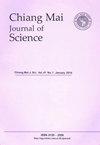Mathematical Modeling of Antibiotic Resistance in Hospital with Dysbiosis
IF 0.8
4区 综合性期刊
Q3 MULTIDISCIPLINARY SCIENCES
引用次数: 0
Abstract
In this paper, we propose and study a transmission model among individuals in a hospital of antibiotic-resistant bacteria considering dysbiosis. The transmission of such bacteria in a hospital setting has been the focus of several previous researches. However, the aspect and contribution of antibioticinduced dysbiosis was not considered in the existing literature. Antibiotics impact the human intestinal microbiome for it unintentionally affects the needed gut microbiota diversity which are fundamental drivers of health and disease in humans. This unintentional destabilization of the healthy human microbiome results in microbial imbalance called dysbiosis. The goal of this paper is to analyze the dynamics of the proposed model in order to come up with insights and possible strategies to control antibiotic-resistant bacterial transmission among individuals in a hospital considering dysbiosis. Possible equilibria of the model system include the resistance-free equilibrium and the endemic equilibrium. The stability of the former means that the antibiotic resistance dies out, while the stability of the latter implies that the antibiotic resistance persists. We determined using sensitivity analysis that the most infl uential parameter is the drug 1 treatment rate. Moreover, we found a threshold value for this parameter, using numerical continuation, where the antibiotic resistance persists. These results provide insights on how to strategize to control the transmission of antibiotic-resistant bacteria in this setting.医院菌群失调患者抗生素耐药性的数学建模
在本文中,我们提出并研究了一种考虑生态失调的耐药细菌在医院个体之间的传播模型。这种细菌在医院环境中的传播一直是以前几项研究的重点。然而,现有文献没有考虑抗生素引起的生态失调的方面和贡献。抗生素影响人类肠道微生物群,因为它无意中影响了人类健康和疾病的基本驱动因素所需的肠道微生物群多样性。这种对健康人体微生物群的无意破坏导致微生物失衡,称为生态失调。本文的目的是分析所提出的模型的动力学,以便提出见解和可能的策略来控制医院中考虑生态失调的个体之间的抗生素耐药细菌传播。模型系统可能的平衡包括无阻力平衡和地方性平衡。前者的稳定性意味着抗生素耐药性的消失,而后者的稳定性意味着抗生素耐药性的持续存在。我们通过敏感性分析确定影响最大的参数是药物1治疗率。此外,我们发现了这个参数的阈值,使用数值延拓,其中抗生素耐药性持续存在。这些结果为在这种情况下如何制定控制抗生素耐药细菌传播的策略提供了见解。
本文章由计算机程序翻译,如有差异,请以英文原文为准。
求助全文
约1分钟内获得全文
求助全文
来源期刊

Chiang Mai Journal of Science
MULTIDISCIPLINARY SCIENCES-
CiteScore
1.00
自引率
25.00%
发文量
103
审稿时长
3 months
期刊介绍:
The Chiang Mai Journal of Science is an international English language peer-reviewed journal which is published in open access electronic format 6 times a year in January, March, May, July, September and November by the Faculty of Science, Chiang Mai University. Manuscripts in most areas of science are welcomed except in areas such as agriculture, engineering and medical science which are outside the scope of the Journal. Currently, we focus on manuscripts in biology, chemistry, physics, materials science and environmental science. Papers in mathematics statistics and computer science are also included but should be of an applied nature rather than purely theoretical. Manuscripts describing experiments on humans or animals are required to provide proof that all experiments have been carried out according to the ethical regulations of the respective institutional and/or governmental authorities and this should be clearly stated in the manuscript itself. The Editor reserves the right to reject manuscripts that fail to do so.
 求助内容:
求助内容: 应助结果提醒方式:
应助结果提醒方式:


